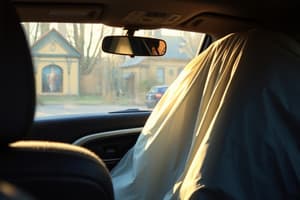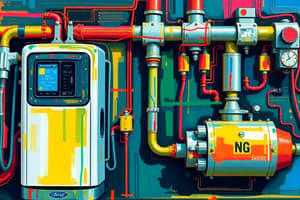Podcast
Questions and Answers
What are some examples of passive restraints?
What are some examples of passive restraints?
- Front driver and passenger airbags (correct)
- Child safety seats
- Automated head restraints (correct)
- Safety belts
What are some examples of active restraints?
What are some examples of active restraints?
- Automated shoulder safety belts
- Anti-penetration windshields
- Safety belts (correct)
- Airbags
Seat belts must be worn ______ and ______.
Seat belts must be worn ______ and ______.
low and tight
Seat belt goes over top of ________ and across _______.
Seat belt goes over top of ________ and across _______.
Do not place shoulder harness _____ shoulder or back.
Do not place shoulder harness _____ shoulder or back.
What can happen if you wear your seat belt behind your shoulder or back in the event of a crash?
What can happen if you wear your seat belt behind your shoulder or back in the event of a crash?
Keeping the seat back in a more upright position avoids _______ _______ in a frontal crash.
Keeping the seat back in a more upright position avoids _______ _______ in a frontal crash.
Air bags are ______ restraints.
Air bags are ______ restraints.
No passenger under ___ years of age in the front seat.
No passenger under ___ years of age in the front seat.
Airbags prevent against _____ and _____ injuries.
Airbags prevent against _____ and _____ injuries.
______ of inflation of an airbag is critical.
______ of inflation of an airbag is critical.
Driver should adjust the seat for a minimum ____ inch clearance between chest and steering wheel.
Driver should adjust the seat for a minimum ____ inch clearance between chest and steering wheel.
How can you make sure the airbag is aimed towards your chest and facial area?
How can you make sure the airbag is aimed towards your chest and facial area?
Steering wheel hand position should be at ___ and ____ or lower.
Steering wheel hand position should be at ___ and ____ or lower.
Avoid a ____ and ____ hand position for blow hole burn prevention.
Avoid a ____ and ____ hand position for blow hole burn prevention.
What is the proper adjustment for head restraints?
What is the proper adjustment for head restraints?
It is better for a head restraint to be _____ than necessary than ______.
It is better for a head restraint to be _____ than necessary than ______.
Where are the air bags for side impact protection?
Where are the air bags for side impact protection?
Where are children safest in a car?
Where are children safest in a car?
Where should an infant sit in the car?
Where should an infant sit in the car?
Where should a child sit in a car?
Where should a child sit in a car?
How long do children sit in booster seats?
How long do children sit in booster seats?
What do occupant restraints protect against?
What do occupant restraints protect against?
How far does your head move if you have your seat belt on in a 31 MPH crash?
How far does your head move if you have your seat belt on in a 31 MPH crash?
How far does your chest move if you have your seat belt on in a 31 MPH crash?
How far does your chest move if you have your seat belt on in a 31 MPH crash?
How far does your pelvis move if you have your seat belt on in a 31 MPH crash?
How far does your pelvis move if you have your seat belt on in a 31 MPH crash?
What are examples of some modern automotive technology?
What are examples of some modern automotive technology?
What are advantages of ABS?
What are advantages of ABS?
If your car has ABS you should....
If your car has ABS you should....
If your car has ABS you should not.....
If your car has ABS you should not.....
What should you do if your oil light comes on while driving?
What should you do if your oil light comes on while driving?
If your temperature light comes on while driving what do you do?
If your temperature light comes on while driving what do you do?
If your alternator light comes on while driving (battery) what do you do?
If your alternator light comes on while driving (battery) what do you do?
Flashcards are hidden until you start studying
Study Notes
Passive Restraints
- Examples include front airbags, anti-penetration windshields, rear airbags, and automated safety belts.
- Designed to provide automatic protection during a crash without driver action.
Active Restraints
- Includes safety belts, head restraints, child booster seats, and child safety seats.
- Requires conscious action by occupants to engage protection.
Seat Belt Guidelines
- Must be worn low across the hips and tight against the body.
- Should fit over the shoulder and across the chest for optimal protection.
- Do not place shoulder harness behind the shoulder or back to avoid serious injury.
- Proper seatback position helps prevent the submarine effect during frontal crashes.
Airbag Information
- Airbags serve as supplemental restraints meant to work with seat belts.
- Should not place a passenger under 12 years in the front seat due to safety concerns.
- Airbags prevent head and chest injuries and rely on precise inflation speed for effectiveness.
- Ensure airbags are positioned to protect the chest and facial areas by adjusting the seat or steering wheel.
Driver Positioning
- Maintain at least a 10-inch clearance between the chest and steering wheel.
- Ideal steering wheel hand placement is at the 8 and 4 positions, avoiding the 10 and 2 positions to reduce burn risk.
Head Restraint Adjustment
- Should be adjusted to ear level to prevent neck injuries.
- A higher head restraint is preferred over a lower one.
Side Impact Protection
- Airbags for side impact protection are located in the upper door frame and seat edge/door panel.
Child Safety
- The safest place for children is in the backseat.
- Infants should be rear-facing in the back seat from birth up to 20 lbs.
- Children should remain in car seats up to 40 lbs and transition to booster seats afterward.
Occupant Restraint Functions
- Protect occupants from ejection, impact, fire, and water immersion during a crash.
Crash Dynamics with Seat Belts
- In a 31 MPH crash, the head moves 1.9 ft, the chest moves 1.3 ft, and the pelvis moves 1.2 ft when secured by a seat belt.
Modern Automotive Technology
- Examples include anti-lock brakes, traction control, electronic handling, and stability programs.
- Enhancements like crumple zones improve crash safety.
Advantages of ABS
- Provides enhanced braking action, better steering control, increased vehicle stability, and improved stopping distance on wet surfaces.
- When driving a car with ABS, increase following distance, practice using brakes, and keep foot firmly on the brake.
Actions When Warning Lights Appear
- Oil light: Stop the vehicle immediately.
- Temperature light: Stop immediately to prevent engine damage.
- Alternator light: Continue driving, but monitor the situation closely.
Studying That Suits You
Use AI to generate personalized quizzes and flashcards to suit your learning preferences.




